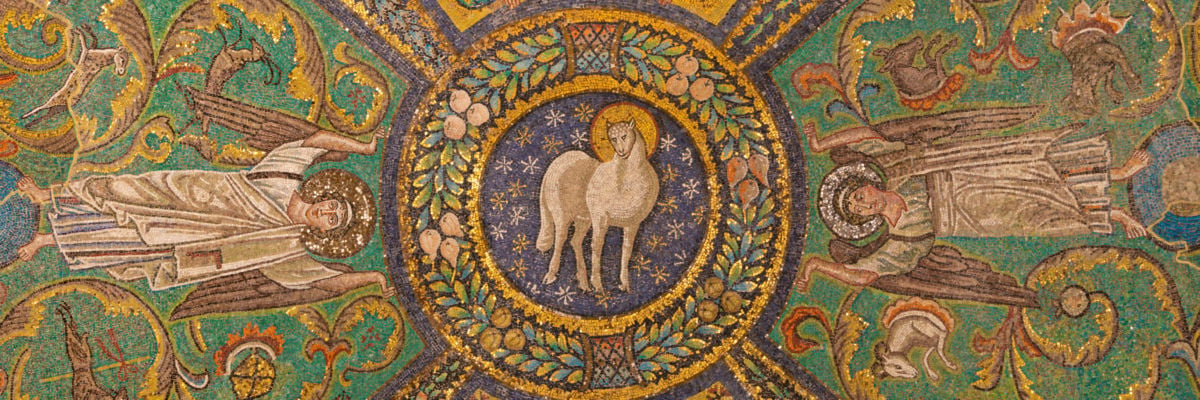
“Behold the Lamb of God, who takes away the sin of the world.”
We’re used the hearing this phrase, or something close to it, multiple times at every Mass. It is deeply embedded in the Christian language of prayer, going back to the New Testament, where St. Paul and St. John take up in their later writings the image first given by St. John the Baptist. It is so familiar that it’s worth stepping back to imagine how strange it must have been to a person in the first century.
The exact phrase “lamb of God” is John’s, but the image of a lamb paired with the idea of “taking away sin” would evoke quite definite connotations for any Jew familiar with his own tradition and scripture. We can note three of these right away. First, the daily sacrifices in the temple at Jerusalem—a powerful and ordinary sign of God’s ongoing relationship with his people. Second, the “suffering servant” in the prophet Isaiah, who is “like a lamb led to the slaughter” (53:7), whose wounds and afflictions are “for our transgressions.” Third, and probably most importantly, there is the Passover lamb, whose blood results in Israel’s salvation both from the angel of death and from slavery in Egypt. To this last image we might further remember Abraham’s language in Genesis 22; when climbing the mountain with his son Isaac, he says, “God will provide himself the lamb for a burnt offering, my son” (Gen. 22:8).
To take all of that biblical history and imagery and theology and pin it on a single person must have been astounding. Who is this man? In the immediate aftermath of Christmas and Epiphany, this repeats in a new moment the same question of those early events: what child is this who attracts angelic hosts, prophetic shepherds, and magi from far lands? According to John, he’s special not just because of who he is, but because of what he does. He is, in some new way that sums up and redefines all previous revelation, our salvation from sin.
Now, this assumes we need saving. This “lamb of God” can be a good thing only if there is something called “sin” that needs to be dealt with. And this is not something to take for granted, even with the biblical background of sacrificial lambs. Is the lamb in the Passover a sacrifice for sin? Maybe. And in light of the later Temple tradition of Israel, such a sacrifice would certainly be associated with a sin offering.
But in the story itself, it deals not so much with the sins of the Hebrew people as with the sins of Pharaoh and the Egyptians. The blood of the lamb marks them; it identifies them; it makes them into a distinct people called by God. Having been so marked, they are free to go into the wilderness to worship God on his holy mountain. There they will be marked again by the blood of the covenant.
And here it’s worth connecting this sign of identity with the new sign of identity proposed first by John the Baptist and eventually sanctified by Jesus: holy baptism. In baptism the images converge, for in that sacrament we are “washed in the blood of the lamb” (Rev. 7:14). This sacrament, as the Church has always understood it, has not one, but two purposes: to free us from both original and actual sin and to incorporate us into the body of Christ.
So in the Lamb of God, we have both salvation from sin and salvation for something. This is important to say, because the first thing makes sense only in light of the second. Our modern age thinks of sin primarily in terms of rules and punishment. The moral law, or so we think, is basically arbitrary, and sin is nothing more than disobedience to authority. But the Catholic tradition always sees sin in light of our divine vocation to holiness. Sin isn’t just breaking an arbitrary rule. It is intentionally falling into sickness rather than health; it is rejecting the relationships that nurture and elevate our nature; it is turning away from the light of what is true and good toward the darkness of nothingness. And so we need to be freed from sin not first because we need to avoid arbitrary punishment, but rather because it is only when we are free that we can pursue the good life that God has given us in creating us and calling us to be his friends.
Behold the Lamb of God; behold him who takes away the sins of the world. Note this: he takes away sin, not simply the punishment due to sin. One of the most pernicious (in my view) ideas emerging from the Protestant Reformation is that salvation is merely a juridical declaration or a trick in cosmic accounting. Luther sums it up in the phrase simul justus et peccator, “simultaneously righteous and a sinner.” I know that I’m caricaturing a bit, but I think some things deserve caricature. This theology makes a fool of God, because to save us, God has to trick himself, in a way. Apparently, he’s incapable of actually making us good, so to make up for that, he slaps a sticker on our souls declaring that our actual spiritual health is irrelevant because Jesus died on the cross.
Now, I don’t mean to demean any and all accounting metaphors. Jesus gives us some bookkeeping parables in the Gospels! But none of that allows us to take John’s statement about Jesus and distort it to mean that Jesus does not take away the sin of the world, but just kind of covers it up. That’s not good enough. It’s not good enough for God, anyway, who is supremely righteous and good and was so intent to preserve his creation from corruption that he sent his own son to free us from sin and death.
In baptism we have been given the power of the Holy Spirit to pursue the life of holiness to which we are called. The other sacraments, especially confirmation and the Eucharist, further strengthen this power in us. This is no mere costume, no mere metaphor, but a real gift that we spend the rest of our lives unpacking. Like the people of Israel in the Exodus, we have been made truly free. Like Israel, we also face temptations. The promised land seems so far away. Maybe slavery to sin wasn’t so bad after all. But the divine Lamb, full of patience and mercy, beckons us to follow him, freed from all that holds us back, to his heavenly country.



